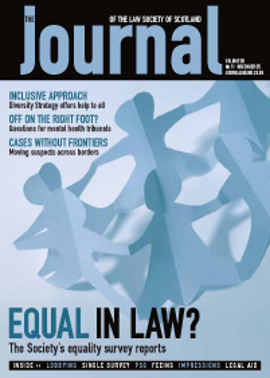Seen to be fair?

Including my last year as a very mature trainee, I have been representing patients subject to applications for detention under the old Mental Health Act of 1984 over the last 12 years in various sheriff courts, very largely in the old Lothian and Central Regions.
When the Millan Committee embarked on its review of the 1984 Act, I submitted my views to it. I was in favour of moving from sheriff court hearings to a tribunal system but was very opposed to having psychiatrists on such tribunals, partly because I had heard that they tended to dominate the mental health tribunals already in operation in England and Wales, but mainly because I had observed over the years that many of my clients who had experience of compulsory detention and medication had a deep mistrust of their psychiatrists. I believed that patients would be most unhappy that a psychiatrist was part of the tribunal and would feel that the whole process was biased and unfair. I understand that such concerns have in fact been expressed by service users consulted about the inclusion of psychiatrists on the proposed tribunals in Scotland.
Not so “general” members
The Mental Health (Care and Treatment) (Scotland) Act 2003 set up tribunals to replace sheriff court hearings but left the composition of the tribunals to be determined by the relevant minister under secondary legislation. This was approved in due course. Objections to psychiatrists, which had been rejected by the Millan Committee, were once again ignored and the tribunals were to be composed of a legal member to chair or “convene” the hearings, a medical member and a general member. Appointments of these three categories were duly made in the early part of this year and I was among those selected to become legal members. Although I had understood that some GPs might become medical members, only psychiatrists were chosen.
As to the general members, I had assumed that they would be quite independent and would be drawn from the ranks of mental health officers, ex-users, carers and others who worked with people with mental ill-health, e.g. in associations for mental health or in supported accommodation. However, in July of this year I happened to look at the Mental Health Tribunals for Scotland (MHTS) website and saw to my amazement and consternation that 47 of the general members were community psychiatric nurses (CPNs). Such nurses are managed in teams by community consultant psychiatrists and are well known to patients under compulsory medication on leave of absence from hospital.
Deferring to seniority
I immediately wrote to Eileen Davie, the President of the MHTS, to express my concern and eventually met her around mid-September. Ms Davie told me that the members of the tribunal had been selected prior to her appointment, but in any case she welcomed the inclusion of CPNs and was confident that with training they would be completely independent of the psychiatrists on the tribunal. She argued that treatment of patients is now determined by multidisciplinary teams and that the psychiatrists no longer have the final decision. I have put these points to various doctors who have been very sceptical that a lifetime of deferring to psychiatrists can be overcome so easily. The medical profession is organised hierarchically and it is simply incorrect to claim that the advent of multidisciplinary teams has ended this.
It should be noted in this context that the new Act, like the old Act, requires the appointment of a Responsible Medical Officer, being a medical practitioner with special knowledge of the diagnosis and treatment of mental disorder, to be in overall charge of the treatment of any patient subject to compulsory measures under the Act. So much for democracy!
The users’ perception
Moreover, and crucially, the argument completely ignores my contention that the service users themselves will be even more likely to perceive the whole tribunal as a stitch-up. It appears that they have not been consulted about the inclusion of CPNs on the tribunals in addition to psychiatrists, but once they learn of this I anticipate that they will object strongly. Natural justice requires that tribunals are not only objectively fair but are seen to be fair by those who are the subject of their decisions. The inclusion of two members of the same profession, one in a subordinate role relative to the other, on a tribunal of three puts them in a majority position and in my view is quite unacceptable on grounds of natural justice. As I have pointed out to Ms Davie, I could not happily sit as convener on such a tribunal, nor would I be able to advise a service-user client that a tribunal, so constituted, was fair and unbiased.
Privilege under attack
As a result of my meeting with Ms Davie, I have resigned from my appointment as a legal member of the MHTS as I am unwilling to be a convener of a tribunal with both a psychiatrist and a CPN nurse on it. I have also decided that I will give up mental health law and not represent clients in front of the MHTS. A contributing factor to this second decision has been the inclusion in the rules of procedure, at her instigation according to Ms Davie, of the requirement that any expert report, obtained by the patient’s solicitor on the patient’s behalf, be produced to the tribunal (see rule 62(5) of the Mental Health Tribunals for Scotland (Practice and Procedure) Rules 2005).
The old Act and related secondary legislation contain no such provision, and I view this change as an ominous sign that the MHTS are in practice going to be inquisitorial rather than adversarial in nature even though the patient’s fundamental liberties are at stake. Not only will this new rule deter patients from agreeing to get second opinions, but in my view it rides roughshod over a fundamental principle of evidence that is enshrined in common law for the protection of the individual – namely that all documents obtained for the giving and/or receiving of legal advice are absolutely privileged, without qualification and their production cannot be ordered by a court. Indeed the very existence of such a report would in my opinion be privileged since an inference could be drawn by the tribunal as to its non-production and thereby prejudice the patient.
I believe that this rule and the inclusion of psychiatric nurses as general members of the MHTS should both be challenged at the earliest opportunity by way of judicial review.
Challenging the tribunal makeup
Another reason for my withdrawal from patient representation before the MHTS is that I do not want there to be any suggestion that I am pursuing a hobbyhorse of my own and that I am improperly persuading a patient to let me do this in his/her name.
However I can only urge solicitors who will be representing patients before the MHTS to make the challenge. I also urge legal members of the MHTS to consider carefully their position if asked to preside over a tribunal flanked by a psychiatrist on one side and a CPN on the other.
On this point, I note that the latest description on the MHTS website of this category of general member has been changed from “CPN” to “Registered Nurse”. As I believe that the background of the tribunal members is now to be revealed at the hearings, I am concerned at this change of designation. Be sure therefore to establish what kind of registered nurse is sitting. I would object to any kind of psychiatric nurse, whether community or hospital. Incidentally I have not objected to psychologists sitting as general members because clinical psychologists are a separate profession although also employed by the NHS. There are also some occupational therapist general members and again I think that this is probably unobjectionable. However I do think that the views of service users should be sought in relation to these two categories.
In the patient’s shoes
I have spent the last 12 years trying to ensure that at the very least my clients felt that they had had a fair hearing. Over this period I have had dealings with all the categories of professionals involved. Overwhelmingly they too have all wanted this and I have the utmost respect for the integrity of everyone whom I have encountered. I had hoped that the new MHTS would be more patient-friendly in terms of surroundings (although I gather that many hearings will now take place in hospitals, which are really no better than sheriff courts), and would certainly put the patient as far as possible at the heart of the proceedings. The two issues that I have raised have arisen in my view because those making up the rules have failed to put themselves in the patient’s shoes. It is, I hope, not too late to rectify the situation. At 63, I am now bowing out of mental health law completely, but I hope that others will take up the torch.
Chris Turner is an assistant with Russel & Aitken, Falkirk
In this issue
- Changing perceptions
- A need undiminished
- Steps forward
- A better way to work
- Combatting the cross-border criminal
- Seen to be fair?
- The lobbying game
- A favoured model?
- A grand day out
- A window of opportunity
- Don't fall at the final hurdle
- Practice guideline: form of accounts and taxation
- Advice for All: the Society's response
- Matter for debate
- Divorcing the divorced
- Uncommon commencement dates
- Scottish Solicitors' Discipline Tribunal
- Website review
- Book reviews
- Still thumbs down
- Search and copy fees changing
- Common currency






